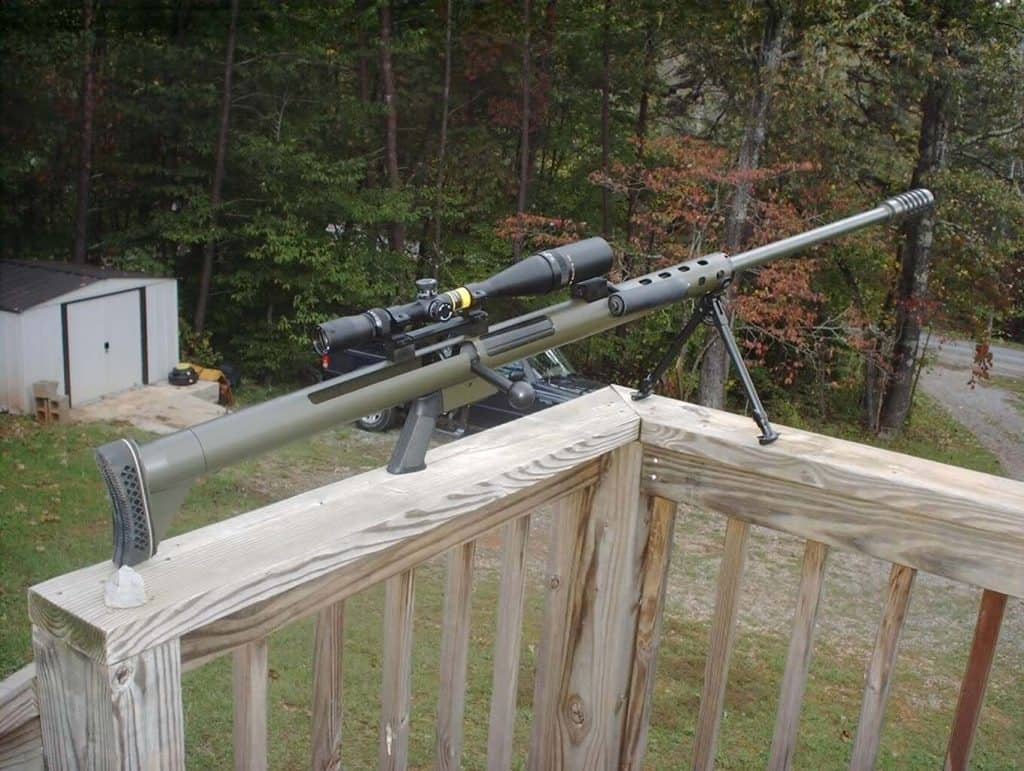If you’re reading articles from Gun Goals, you’re obviously a firearm enthusiast. You most likely enjoy sitting in a blind waiting for the deer to come to your food plot or competing against your friends at the shooting-range.
But now, you’re beginning to wonder about how to take to your hobby to the next level. You hear people talk about building your own firearm from the ground up at home. We all know how much fun it is to look at a product forged with your own hands.
You look into how to make a gun and find that it’s not as hard as you thought. Next time you’re at home, you check out your own guns at home with a new, technical viewpoint and see the serial number.
You wonder, “Am I required to apply a serial number to a homemade firearm?”
This article will answer that question for you and related questions regarding firearm serial number laws, homemade gun laws, and others. We dig into the legal language, so you don’t have to.

DISCLAIMER
We here at Gun Goals are not lawyers. All facts and claims are referenced to their respective sources, so you can be sure that what we say is backed up. However, this article can’t take the place of advice from someone who specializes in law.
Laws will change depending on different factors including time, the political party in power, and current events. Make sure to double check this information on your own and protect yourself from prosecution.
If you do decide to make your own firearm, make sure you understand the process and follow directions to the utmost safety standards. Responsible gun owners are well aware of the power and potential risk involved in firearms. Do not make your own unless you feel it can be done safely.
SHORT ANSWER
No. Federal law does not require a serial number be engraved on a homemade firearm that is intended for personal use. As long as the person isn’t selling or distributing the firearm or forbidden to possess a firearm, they may produce their own.
This answer doesn’t cover the history and controversies involved in making your own untraceable weapon, and, again, these laws may vary over time and state. Make sure you read ahead, so you can fully understand what is involved in this complicated issue.
LONG ANSWER
This section goes into detail on the federal and state laws, what the most common gun builds are, and current controversies involved in making your own guns. Read on and get informed.
FEDERAL LAWS REGARDING SERIAL NUMBERS ON HOMEMADE FIREARMS
The Gun Control Act of 1968—better known as the GCA—was the initial law that required the licensing of the sale and manufacturing of firearms. The law was passed in response to the 1963 assassination of President John F. Kennedy.
However, this law is only applicable to only people who are in the business of selling or distributing guns. If you are making a firearm for your personal use only, then you are legally allowed to do so. According to the ATF website, you do not need any kind of license at all to produce your own gun.
The definition of personal use is better defined by what personal use is not. Essentially, the key comes down to the intent of the maker. While this is hard for officials to enforce and investigate, if you wanted to build legally, it’s important to know the qualifications.
If you make a firearm with the intent to sell it, then you are making it for sale. You are required to get a Federal Firearm License and put a serial number on the gun. Selling face-to-face when you are done with its use is allowed.
Making a firearm as a gift or at the request of a friend is considered distributing. If you give it away later after you use it, then it’s OK. Keep in mind that making a gun with the intent to give it to a family member is still illegal.
STATE LAWS REGARDING SERIAL NUMBERS ON HOMEMADE FIREARMS
In most cases of laws, a state’s law trumps the federal law unless otherwise specified. City and Municipality laws also take precedence in the absence of federal laws. If your state requires serial numbers on all homemade firearms, then you must legally do it.
At the time of this writing, our research has turned up only one state that requires registration of homemade weapons. California passed a law in 2016 specifically on this issue, and now there is a stiff penalty for making an unregistered firearm.
While California may be the only one at this time, other states and politicians have been working on passing laws regarding this. New York City and Washington, D.C. both attempted to pass laws regarding 3D printed guns that are unregistered without success. Philadelphia did ban owning or making of 3D printed guns without a license.
Because of the variance and quick moving nature of politics you need to check your own state laws to make sure that what you want to build is still OK. You could always dive into the laws yourself to see what you can build without registering, but legal language is complicated and confusing.
The NRA-ILA (National Rifle Association’s Institute for Legislative Action) provides guides to gun laws by state. This is a much easier way to research what you can and can’t build.
EXCEPTIONS TO THE LAWS ABOUT SERIAL NUMBERS
Be aware of the following exceptions, though. Always do your homework if you have a specific question and contact an expert or the Bureau of Alcohol, Tobacco, Firearms, and Explosives (ATF) directly. It’s better to be cautious and safe than to be liable for building an illegal firearm.
TYPES OF FIREARMS PROHIBITED OR REGULATED
There are many types of firearms you can legally make without including a serial number or registering. However, you cannot make “a non-sporting semiautomatic rifle or shotgun from 10 or more imported parts.”
Another exemption to this rule involves National Firearms Act—or NFA—regulated firearms. NFA regulated firearms can include the following:
- Short barreled shotguns
- Short barreled rifles
- Machineguns
- Destructive devices
A complete list of NFA firearms is in the law, but the language is kept vague. There is good news, though, you can still make these if you want. According to the ATF, these weapons are not allowed to be made at home unless a tax is paid and you get advanced approval, but once that’s done, go for it.
If you’re wondering whether your current project is covered by the NFA, err on the caution. Check with a lawyer or your state gun owner’s group before doing anything that could get you in trouble.
PEOPLE NOT ALLOWED TO POSSESS A FIREARM
Naturally, if you aren’t legally allowed to possess a gun, you can’t make your own. Common reasons for this include being a convicted felon, having a mental disorder, or being the recipient of a domestic violence restraining order. For a more complete list of disqualifications, look at the ATF list.
Federal law does allow for relief from disabling offenses, but because of budget constrictions, the ATF will not pursue investigations into restoring the person’s ability to possess or purchase firearms. Without this permission, it is illegal to make your own firearm.
The only action you can take at this point in time depends on where your offense was taken. If it was a federal issue, only a Presidential pardon can forgive the offense. If it was a state offense, you must contact your State Attorney General’s Office.
CONTROVERSIES
Before you go ahead and start building your own firearm, it would be good to be aware of the controversies around guns without serial numbers. Look at these two issues and then decide for yourself what you want to do. As long as it’s within the law, you have every right to do so.
GHOST GUNS
Ghost guns or 80% receivers are firearms made from unfinished receivers. By purchasing a receiver not completed (or 80% finished, where the name comes from), a gun-making amateur can finish the receiver and use it to build their gun. This gun would be considered homemade, and—if made for personal use only—not be required to have a serial number and registered by the ATF.
80% receivers are not considered guns or firearms and are outside of the control of the GCA. These can be purchased easily at gun shows or dealerships. The receivers require tooling to finish, and there are kits available to purchase for people interested in doing so.
Because these guns are untraceable, it creates a certain amount of problems for authorities. When crimes are committed with these ghost guns, investigations are unable to cross-reference purchasing and ownership to solve violent crimes. There are no serial numbers, and so the guns are completely untraceable.
It is unclear exactly how many crimes involving ghost guns there have been. High profile examples of crimes with ghost guns include:
- 2013, John Zawari used a homemade rifle to kill five people in California
- 2017, Kevin Neal used two homemade rifles to kill six and injure 10 others
- 2018, Aaron Ibrahem used a .40 glock in a Walmart shooting
For this reason, officials suggest registering your homemade firearms even if the law doesn’t require it. Contact your local police stations to ask how to register and engrave a serial number. Ultimately, though, it’s up to you.
3D PRINTED GUNS
Technology is a great thing. We can access information instantly and create better and more efficient tools for us to use. The advent of the 3D printer allows us to create great things, but it presents a complicated issue.
Similar to 80% receivers, 3D printed guns can be made without any serial numbers and—in some cases—require less smithing knowledge than finishing a receiver. Plans can be found online and programmed directly into computers and printers.
One major concern for authorities and transit safety concerns is the fact that these 3D printed guns can be made from plastic and other materials that do not trigger metal detectors. This opens up a huge public safety concern that officials have worked hard to deal with.
It is currently illegal to make or possess a firearm that isn’t detectable by metal detectors or x-ray machines. The law specifically lists airport security as a major concern concerning these weapons.
As with 80% receivers and homemade firearms in general, people may make their own 3D printed firearms if it’s intended only for personal use and not for sale or distribution. These guns do not need a license or serial number engraved.
RELATED QUESTIONS
Can I take my homemade gun over state lines? – Yes, you can, if your gun was made legally in your state you can transport it over state lines. However, if the state’s laws do not allow for guns in this manner or require permits for guns in general, you need to keep it locked and separated from the ammo.
How do I make my own gun? – Many guides are online. I would suggest talking to a gunsmith, gun dealer, or expert at a gun show to make sure that what you are building is safe for use.
Is (insert specific caliber or gun type) legal to make without a serial number? – Double check the ATFs regulation regarding what is regulated by the NFA. If your gun isn’t in that category, then, yes you can as long as it’s for personal use only.
CONCLUSION
By reading this article, you can now answer your friends’ question, “Am I required to apply a serial number to a homemade firearm?” You are not required to obtain a license or apply a serial number to your homemade firearm as long as it is intended for personal use. Refer back to the exceptions for a clearer picture of the laws.
Remember to always check your state and local laws for changes that occur over time. As always, be safe and happy shooting!
If you enjoyed this article you’ll probably like these:


